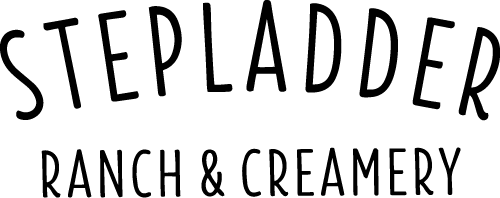When Stepladder was still a hobby, it was just a handful of goats and a lot of elbow grease. Our early mornings (and evenings) began with hand-milking each goat. It was just us, a few hardworking does, and a whole lot of determination. We quickly upgraded to some basic bucket milkers, but it was still a highly manual process.

That fresh milk was carried straight to our first 50-gallon cheese vat, the Chester Jensen. It was a very manual process and the vat took almost 2 hours to heat up. It wasn’t very efficient, but it’s how we’d create our first batches of Stepladder cheese.

The Chester Jensen
As our herd and our creamery business modestly grew, we graduated to a bucket milking system. This was a total game-changer at the time: one machine, a bit more efficiency, and way less strain on our arms. It meant we could milk more goats and spend more time focusing on the cheese itself.

Here’s Michelle using a bucket milker. Lily supervises from a distance.
With more milk, we also needed to increase the size of our cheese vat. We sprung for a 200-gallon Van Zijll vat, which gave us room to make bigger batches, experiment with new styles, and better meet the growing demand for our cheeses at markets, restaurants, and cheese counters. This dutch cheese vat came from a dairy in Idaho. We still use it today for our smaller farmstead cheese batches and some of our soft cheeses.

Later, we lucked out and received this old tank from a friend that used to be at St. Benoit Creamery. We built a franken-vat out of it and named it the Agi-tron since it had a custom agitator. We would process milk in this vat and then gravity feed it into the Van Zijll and other fermentation vessels.

We later sold that and bought another small vat to dedicate to our cultured butter production. When we powered it up, it had an error message on the PLC (programmable logic controller) that flashed “1999”. Naturally, we named it “Prince”.

These days, we’re milking 60 goats daily using a modern pipeline milking system. It brings the milk directly from the goats to our bulk tank, keeping things clean, efficient, and gentle for the animals.

Finally, we added a big (for us) Dutch vat made by Van Riet in 2020 that holds over 1600 liters. This is our daily work horse. We have the Van Riet and the Van Zijll up on a platform so we can gravity feed the curds down into our draining tables and help save our cheesemakers backs.


After a decade, we’ve come a long way from that first hand-milking session. But what hasn’t changed is that it's all still happening right here on the farm in the very same barn.



